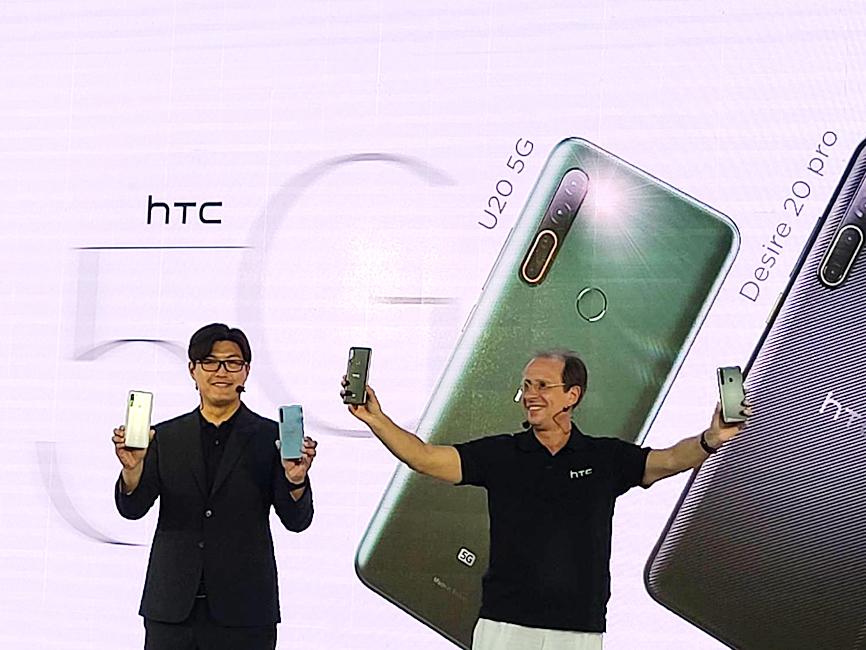HTC Corp (宏達電) yesterday posted a NT$1.83 billion (US$62 million) loss for last quarter, its 9th consecutive quarterly loss, as its expansion into virtual-reality headsets has yet to bear fruit, it said in a filing with the Taiwan Stock Exchange.
On an annual basis, that was an improvement from the NT$2.22 billion loss it registered in the same period last year, but on a quarterly basis, it widened from a loss of NT$1.68 billion in the first quarter.
Second-quarter revenue was NT$1.34 billion, up 1.02 percent sequentially, but down 52.14 percent from a year earlier.

Photo: Wang Yi-hung, Taipei Times
Gross margin rose to 26.5 percent from 20.3 percent a year earlier, also up from 26.3 percent in the first quarter.
For the first half of this year, HTC posted a net loss of NT$3.5 billion, an improvement from a loss of NT$4.68 billion in the first half of last year. That represented a loss of NT$4.28 per share, better than its loss of NT$5.69 per share in the same period last year.
The company swung back briefly to a profit in the first quarter of 2018 by selling part of its smartphone unit to Alphabet Inc’s Google, resulting in a US$1.1 billion windfall. However, its downward spiral has continued with losing quarters ever since.
HTC has not lacked for innovation, introducing Exodus, the first blockchain smartphone, in 2018. In June, the company unveiled the HTC U20 5G, the first made in Taiwan 5G mobile phone.
The company has also diversified away from its core cellphone business by investing heavily in virtual-reality technology with its Vive range of headsets. However, its VR operations still account for only a small fraction of the company's sales.

MULTIFACETED: A task force has analyzed possible scenarios and created responses to assist domestic industries in dealing with US tariffs, the economics minister said The Executive Yuan is tomorrow to announce countermeasures to US President Donald Trump’s planned reciprocal tariffs, although the details of the plan would not be made public until Monday next week, Minister of Economic Affairs J.W. Kuo (郭智輝) said yesterday. The Cabinet established an economic and trade task force in November last year to deal with US trade and tariff related issues, Kuo told reporters outside the legislature in Taipei. The task force has been analyzing and evaluating all kinds of scenarios to identify suitable responses and determine how best to assist domestic industries in managing the effects of Trump’s tariffs, he

TIGHT-LIPPED: UMC said it had no merger plans at the moment, after Nikkei Asia reported that the firm and GlobalFoundries were considering restarting merger talks United Microelectronics Corp (UMC, 聯電), the world’s No. 4 contract chipmaker, yesterday launched a new US$5 billion 12-inch chip factory in Singapore as part of its latest effort to diversify its manufacturing footprint amid growing geopolitical risks. The new factory, adjacent to UMC’s existing Singapore fab in the Pasir Res Wafer Fab Park, is scheduled to enter volume production next year, utilizing mature 22-nanometer and 28-nanometer process technologies, UMC said in a statement. The company plans to invest US$5 billion during the first phase of the new fab, which would have an installed capacity of 30,000 12-inch wafers per month, it said. The

Taiwan’s official purchasing managers’ index (PMI) last month rose 0.2 percentage points to 54.2, in a second consecutive month of expansion, thanks to front-loading demand intended to avoid potential US tariff hikes, the Chung-Hua Institution for Economic Research (CIER, 中華經濟研究院) said yesterday. While short-term demand appeared robust, uncertainties rose due to US President Donald Trump’s unpredictable trade policy, CIER president Lien Hsien-ming (連賢明) told a news conference in Taipei. Taiwan’s economy this year would be characterized by high-level fluctuations and the volatility would be wilder than most expect, Lien said Demand for electronics, particularly semiconductors, continues to benefit from US technology giants’ effort

‘SWASTICAR’: Tesla CEO Elon Musk’s close association with Donald Trump has prompted opponents to brand him a ‘Nazi’ and resulted in a dramatic drop in sales Demonstrators descended on Tesla Inc dealerships across the US, and in Europe and Canada on Saturday to protest company chief Elon Musk, who has amassed extraordinary power as a top adviser to US President Donald Trump. Waving signs with messages such as “Musk is stealing our money” and “Reclaim our country,” the protests largely took place peacefully following fiery episodes of vandalism on Tesla vehicles, dealerships and other facilities in recent weeks that US officials have denounced as terrorism. Hundreds rallied on Saturday outside the Tesla dealership in Manhattan. Some blasted Musk, the world’s richest man, while others demanded the shuttering of his